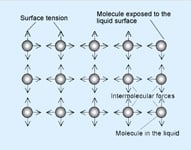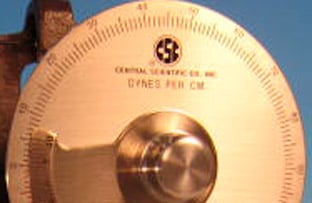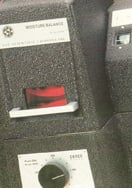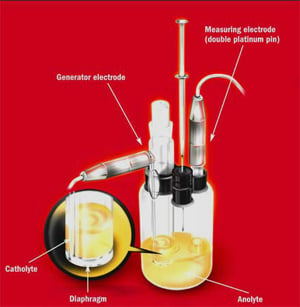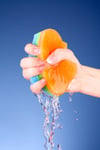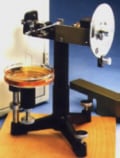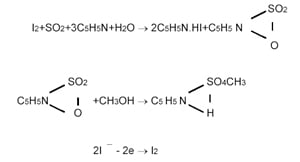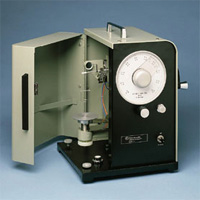One of the ways to describe surface tension in fluids is: the property of a liquid’s surface that resists force. It serves as a barrier to foreign materials and holds the liquid together. This ever-present property is caused by unbalanced forces on surface molecules that pull toward the main part of the liquid.
Art Gatenby
Recent Posts
What are the Primary Conditions Affecting Surface Tension?
Posted by Art Gatenby on Sep 23, 2013 12:42:00 PM
Topics: Wilhelmy Plates, Automatic Digital Tensiometer, Automatic Surface Tension Measurment, duNouy Rings, Tensiometer, Surface Tension Measurement, Surface Tension, Interfacial Tensiometer, Fisher Tensiomat, Liquid Properties, Digital tensiometer
Surface Tension Measurement -- How High Is High Enough?
Posted by Art Gatenby on Mar 29, 2013 5:12:00 PM
I am regularly startled by little things that trigger new understanding about our slice of the instrument World. This time it is about surface tension.
Topics: Automatic Surface Tension Measurment, duNouy Rings, Tensiometer, Surface Tension Measurement, Surface Tension, Liquid Properties
I am very excited about a new update to the CSC Digital Moisture Balance. To give you a perspective of why I’m excited about this Moisture Content Analyzer update, I thought you my be interested in the story of the transition from a classic mechanical moisture analyzer to the current highly robust and durable electronic instrument of today.
Topics: Moisture Analysis, Moisture Testing, Loss-On-Drying
As you know the Karl Fischer Method of moisture analysis has a reputation of being water specific. The method works through the use of a special Karl Fischer Reagent.
Topics: Coulometric Karl Fischer, Volumetric Karl Fischer, Moisture Analysis, Karl Fischer Oven, Karl Fischer, Karl Fischer Titration
We get repeated queries about calibration of our DuNouy Ring Tensiometers. That makes me think that calibrating procedures to insure accurate surface tension measurment needs some clarification.
Topics: duNouy Rings, Tensiometer, Surface Tension, Calibration
Moisture Content - Water Activity – Are They the Same Thing?
Posted by Art Gatenby on Mar 6, 2012 4:19:00 PM
The other day, I woke up with a lingering quandary: Are the concepts of
Moisture Content and Water Activity the same thing?
As usual, I’ve decided to take on the task of clarifying the difference. I hope I pull it off.
From the perspective of someone who supplies instruments that measure moisture content, water activity has not been a primary consideration. However, I believe that comparison and contrast of these important concepts will be useful.
Topics: Moisture Sorption Isotherm, Infrared Moisture, Moisture Analysis, Water Activity, Moisture Testing, bound water
“Why are my Moisture Test results inconsistent?”
That is an issue for many of you who test for moisture. We discussed the complexities and multiplicity of issues involved with moisture content determination in our “Loss-on Drying Moisture Analysis and other Moisture Mysteries” series.
In addition to intrinsic properties of test samples that may adversely affect moisture testing systems, automatic equipment parameter set-up, operator oversights and sample handling contribute to seemingly intractable moisture test result inaccuracies.
Topics: Moisture Analysis, Moisture Testing, Karl Fischer, Loss-On-Drying, Moisture
Within the catalog of questions we are asked is a category related to Calibrating duNouy Ring Tensiometers. The subject matter ranges from how, why and what is proven?
I guess the immediate and wise-assed answers are:
Topics: duNouy Rings, Tensiometer, Surface Tension Measurement, Surface Tension, Calibration, Interfacial Tensiometer, Fisher Tensiomat, Liquid Properties
Karl Fischer Moisture – Answers to Questions We Get Asked
Posted by Art Gatenby on Jul 29, 2011 4:08:00 PM
When People are first introduced to the Karl Fischer Moisture Determination Method, eyes glaze over and we can perceive a mental “Why did I ask?”
If you have any history with moisture analysis, you will have found, that for some applications, the Karl Fischer Titration Method is the best and sometimes the only way to get an accurate moisture measurement.
Topics: Moisture Analysis, Karl Fischer, Karl Fischer Titration, karl fischer moisture, karl fischer moisture determination, karl fischer questions

